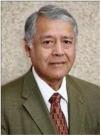On the afternoon of Sunday 29 March the distinguished rheumatologist, researcher and mentor Doctor Luis R. Espinoza died in the city of New Orleans, the United States, at the age of 76 years. Dr. Espinoza —“Lucho”, as he was affectionately known to many— was from Pisco, Peru. He studied Medicine at the Universidad Peruana Cayetano Heredia in Lima, where he graduated in 1968. He spent his internship in the Jersey City Medical Center, his Internal Medicine internship in the Barnes-Jewish Hospital of Washington University School of Medicine, San Luis, Missouri, and his Rheumatology fellowship in McGill University Royal Victoria Hospital, Montreal, Canada. He spent his post-doctoral fellowship in Rockefeller University, in New York City. He then returned to McGill University as a member of its medical staff. In 1975 he was recruited as Associate Professor by the Rheumatology Department of the University of South Florida School of Medicine in Tampa. The authors of this tribute arrived at the latter city in January 1990 to spend a Research Fellowship with Maestro Espinoza. In January 1991 we moved to the city of New Orleans, because Dr. Espinoza had been awarded the position of Head of Rheumatology in the Internal Medicine Department of Louisiana State University Health Sciences Center after a competitive examination, and he occupied this position until his death.
His wife, Dr. Carmen G. Espinoza, an outstanding dermatopathologist and his companion during 50 years, told us that Dr. Espinoza had suffered a malign condition during the last year of his life, for which he was treated by chemotherapy. In spite of this, he had carried on working in the hospital as usual.
Dr. Luis R. Espinoza was an extraordinary human being. He used to greet his fellows in the airport when they arrived at the city where they were to spend their Research Fellowship, and he lodged them in his home until they found somewhere to live. We were invited to eat with him at his home several times. Once when New Orleans was affected by a powerful hurricane he lodged us, two of his fellows, in his home. Dr. Espinoza also knew how to listen to his fellows, for personal questions as well as academic matters. He included all of his students in all of his academic activities. In the field of research he gave us the opportunity to take part in all of his own works, as well as in some of those by the assistant doctors who worked with him. To complete all of this we had the opportunity of getting to know and work with other fellows and rheumatologists from Latin America and other countries (including the United States), as well as researchers and laboratory technicians.
Dr. Espinoza was also tireless and enthusiastic in caring for his patients. His work with them led to his being awarded numerous prizes, such as the Paulding Phelps Award by the American College of Rheumatology, for outstanding dedication by rheumatologists to their patients. He received this award in 2007 for his work during the disaster caused by hurricane Katrina on New Orleans. He also had an impressive clinical capacity and a natural gift for reaching the correct diagnosis, to such a degree that once an Internal Medicine intern in Tampa General Hospital said to us: “Dr. Espinoza is always right”, referring to the fact that he always made the correct diagnosis for each patient.
Respecting his scientific work, Professor Luis R. Espinoza published more than 500 original papers (which were cited more than 7,000 times). He also wrote more than 200 chapters in books and published 30 books himself. The subjects that interested him the most were spondyloarthritis, chiefly psoriatic and reactive arthritis, rheumatic manifestations caused by HIV infection (a field in which he was a pioneer), the role of prolactin in several rheumatic diseases and rheumatic manifestations caused by silicone breast implants, among others. Proof of his unceasing scientific activity, which he continued until the last days of his life, includes his last book “Infections and the Rheumatic Diseases”, published in 2019, together with 4 papers published in the same year.
He received innumerable prizes and international rewards for his work, including Master of the American College of Rheumatology in 2008, Master of PANLAR in 2008, Master of the American College of Physicians in 2009, Maestro of Rheumatology in several Latin American countries and the Verna Wright Prize in 2014 for his contributions in the field of psoriatic arthritis. He was president of PANLAR (2008), Chair of ILAR (2010-2012) and editor-in-chief of the journal Clinical Rheumatology (2014-2018). His editorial work also included his work as a reviewer for several international scientific journals, and he was a member of multiple boards of editors.
Dr. Espinoza was a man of indisputable integrity and notable professional ethics. His modesty and humility were impressive, in spite of his great achievements and qualities. This life and death lesson is the most valuable thing left to us by our teacher and friend Luis R. Espinoza, who helped his peers until the end of his days. He has gone ahead of us on a voyage that has no return, leaving us with the pain of his absence and our measureless and eternal thankfulness for his living legacy.
Please cite this article as: Jara Quezada LJ, Silveira LH, Martínez Osuna P. Vida, obra y muerte del profesor Luis R. Espinoza: un legado viviente. Reumatol Clin. 2020;16:515–516.








